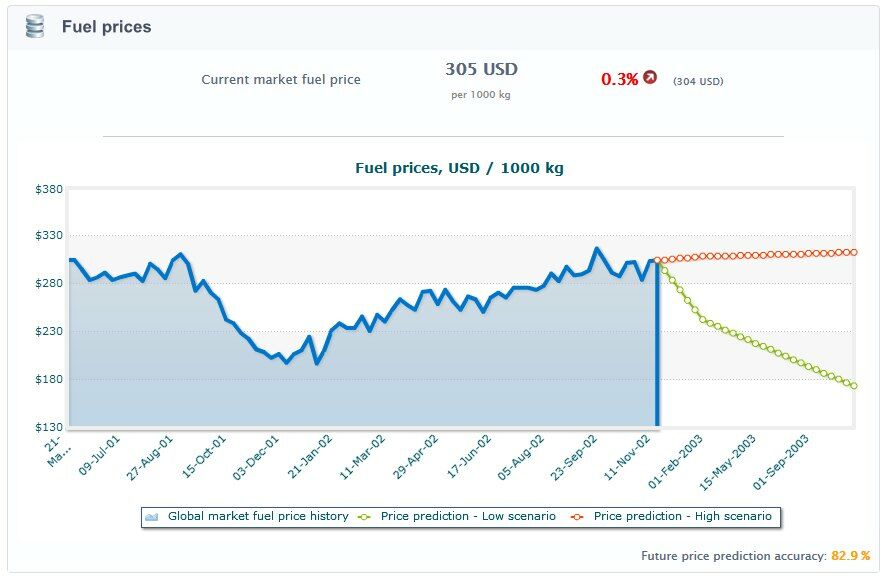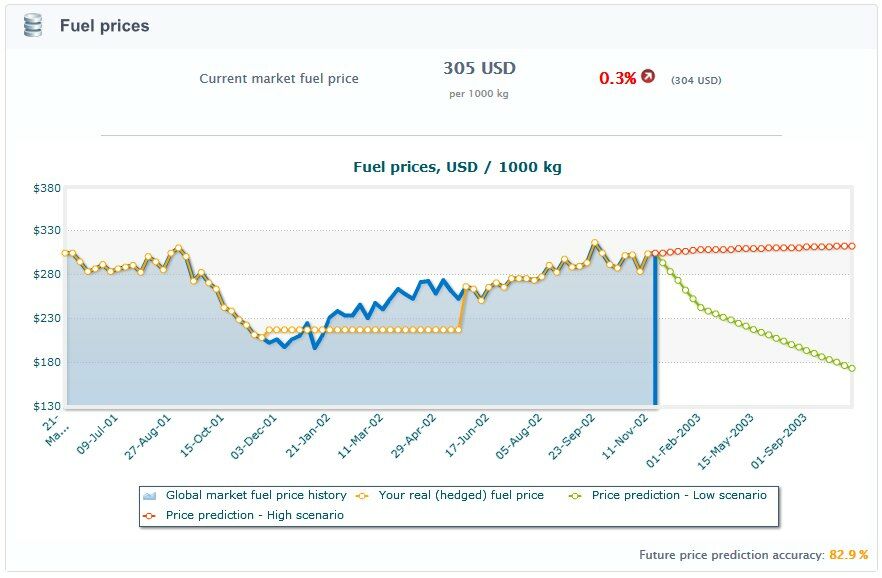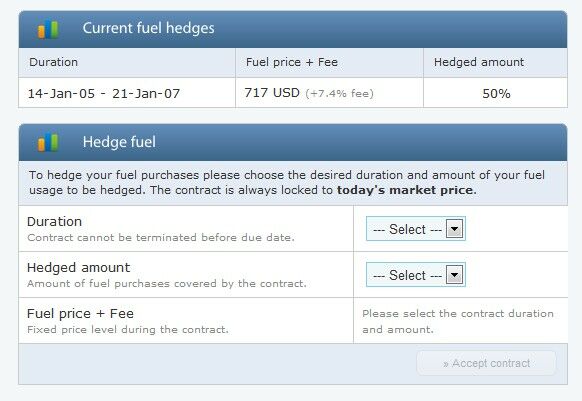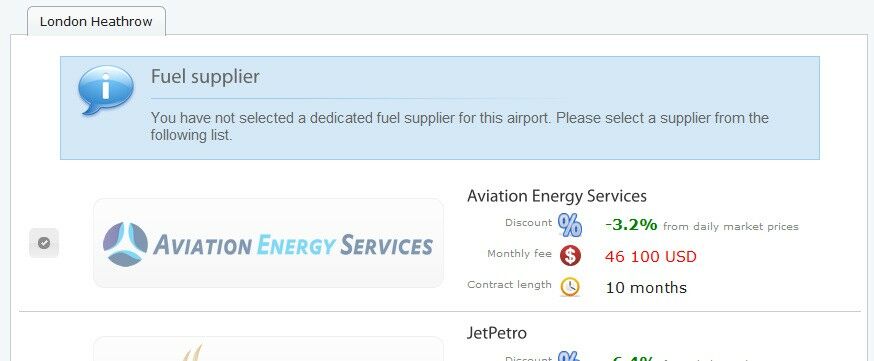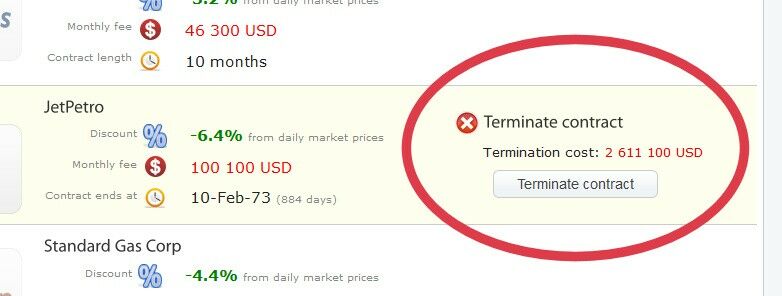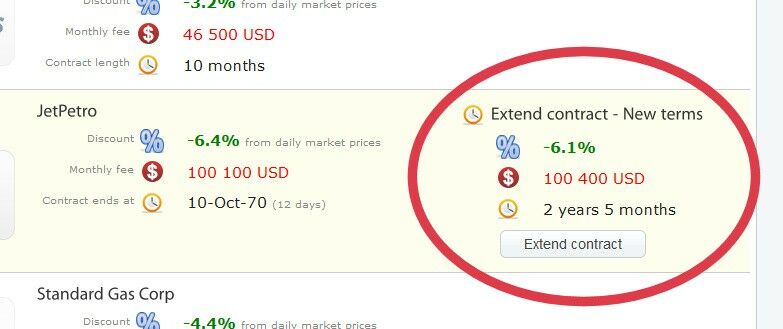The fuel management page allows you to monitor the current fuel prices, arrange your fuel supplier contracts and also negotiate fuel hedging contracts. Your staff will also provide predictions of future fuel prices.
Fuel Prices
Economy Model
The price of aviation fuel in each game world is based on pre-programmed economic factors. The economic model is different in each game world. In most cases the fuel price model is custom and does not follow the real historical trends. However, in some cases the historical fuel price is used (we wish to create variation and unpredictable events and events in fuel prices are one part of it).
Player actions have no effect on the fuel prices in the game worlds, and their airline operation models should be adjusted according to the economic situation in the scenario at any given time. As a general rule of thumb, one should always assume that the nominal fuel price goes up as time goes on.
For the sake of simplicity, the jet fuel and fuel used by piston-engined aircraft are the same and have the same price.
The price is updated once a week and the global average fuel price for each week is displayed (for example on the Dashboard page with a trend index comparing the previous week).
Fuel Price History And Future Price Predictions
The historical data of fuel prices can be viewed from the Fuel Management page. It displays up to 2 years of fuel price history.
Your economic and finance department staff will prepare a prediction of the future fuel prices. This prediction can be viewed from the same chart with the historical fuel prices and it includes two scenarios: "low price" and "high price". The future fuel price will be usually somewhere in between these two ends of the prediction. Please keep in mind that their prediction is never fully accurate, and the accuracy goes down if you have too few staff employed and / or staff morale is low. Accuracy prediction improves closer to the date.
The chart shows the past fuel price in blue, and the predictions in red / green. This example prediction has a heavy downward trend so it is expected that the fuel price will drop in the very near future.
Aircraft Fuel Usage
The fuel management and fuel used by aircraft on routes is almost fully automated. Players, if they wish, can set up fuel supplier contracts at their base airports.
Aircraft are fuelled always at the current market price at each airport (if no fuel supplier contract exists for your company at that airport). Aircraft are also refueled at every turnaround so fuel "tankering" by carrying extra fuel for return flight is not modeled.
Fuel usage for each aircraft is calculated with a system that takes into account the different phases of the flight and it seeks to optimise the cruise altitude for lowest possible fuel burn. For more information about the detailed aircraft performance model, please see the dedicated manual chapter: Aircraft Performance.
Government Subsidies
You may receive temporary or permanent subsidies from the local government based on the aircraft models you operate. These can lower your fuel bill substantially. You can read more from the airports chapter of the manual: Government Subsidies.
Fuel Hedging
Fuel hedging is a contractual tool that can be used to reduce the exposure to volatile and potentially rising fuel costs. A fuel hedge contract allows the airline to establish a fixed and known fuel cost base for the future, and may protect the airline from high fuel costs or otherwise just help in budgeting for the future when fuel costs are known.
If the company takes a fuel hedge and the price of fuel declines, the company will effectively be forced to pay an above-market rate for fuel. And vice-versa, if the fuel price increases the company is winning compared to paying standard market prices of the fuel.
In AirwaySim, the fuel hedging system is simplified and the airline owner has the ability to "lock in" the present daily market fuel price for a period of 1-12 months by agreeing to pay a commission (1-8%) to the fuel broker. Once the contract has been signed it cannot be cancelled and it continues to run until the end date. When the contract is nearing its end it can be re-negotiated with the new terms of that day.
The following image explains the "winning" situation in a fuel hedge. There an airline has hedged 100% of their fuel usage in late 2001, and after that the fuel prices have gone up rapidly. When the contract has ended in mid-2002 the actual paid fuel price jumps back to the market prices since the airline has not renewed the hedge contract. In this case the airline has made a smart move and saved money on fuel costs (blue - market prices of fuel, yellow - actual hedged cost of fuel). However if the manager had made a similar move when the fuel prices were going down, the airline would have been forced to pay extra.
Note also in the image that the future fuel price prediction indicates a possibility of a heavy future price drop.
Adding Hedges
Your airline may hedge up to 100% of the fuel usage of the airline. The Fuel Hedges section of Fuel Management page displays a simple form to activate the hedges. Also your current contracts are displayed here.
You have the option to choose the duration of the hedge deal and the amount of fuel to be hedged (10-100%). By selecting both you will be displayed the fuel hedge's price and fee. The fuel price is always locked to the price of todays fuel price and it will be added with the fee % of the hedge broker. The longer and more extensive the contract the higher the cost (fee).
If you choose to hedge 100% of your fuel at a price of $500/tn + 3% fee for 10 months, the actual fuel price will be $515/tn and this price is fixed for the next 10 months.
Another example, if you choose to hedge only 50% of your fuel with the same terms (10 months, $500/tn + 3% fee), your actual fuel price will be half-fixed and half from daily market prices. The actual true fuel cost for each day with and without the effect of the hedges is displayed on Fuel Management page.
Please remember again that a hedge cannot be terminated.
Fuel Supplier Contracts
Each airline has the ability to negotiate fuel supplier contracts for each base airport. Every airport in the simulation world has at least one fuel company, larger airports have several companies to choose from.
Each supplier company offers individual contract terms that change and update on certain intervals. All of the terms and details are visible on the Fuel Management page where you have a 'tab' for each of your base airports with all the fuel suppliers visible. The fuel suppliers will grant you a discount on the daily market prices of aircraft fuel but will take a fixed amount as a contract fee if you sign a contract with them.
Making supply contracts is voluntary, but you may save money if you do one. Just make sure that the contract terms are suitable for your company (mainly that the fixed contract fee is not too big compared to discount).
Remember that each contract has a dedicated contract term / length. The contract is in force until that date and may only be cancelled before that by paying a fee.
Contracts may only be made for your base airports. Fuelling at other airports ("outstations") is automatic and does not require contracts, and happens always at the market price.
Terminating Contracts
The supplier contract may be terminated up to three weeks before the contract ends. Termination will cost the player 50% of the remaining fixed monthly fees. If contract will end in less than three weeks it may not be terminated anymore, but only extended. The player will be notified about the contract expiration three weeks in advance, in case he wishes to extend it.
Extending Contracts
Player is allowed to re-negotiate the supplier contract with the same supplier up to three weeks in advance before it expires. Contract extensions are always negotiated with new terms which are shown next to the current contract. When the contract is extended the new contract terms become effective immediately. If you wish to change the supplier you must always first wait for the first contract to expire and only after that it is possible to negotiate another contract with another supplier.
Airport Relocations
If the player's base airport is relocated (airport closes and new one opens), the contract moves automatically to the same supplier at the new airport. If player closes his base airport himself the contract is also terminated automatically (extra termination cost may apply).
Fuel Contract And Fuel Hedging
Please note that the fuel supplier contracts and fuel hedging are two separate contract methods. You may use both at the same time if you wish.
Fuel supplier contracts apply only to your base airports (only the airports where you have signed a contract), while the fuel hedging affects all of your fuel purchases globally around your route network. If you have both contracts active, you will purchase fuel at the given hedged price from the financial markets, and after that the fuel supplier will give you a separate discount for using his company only at your home base airport. Combining both of the contract types may yield substantial savings on fuel costs, if planned carefully.


